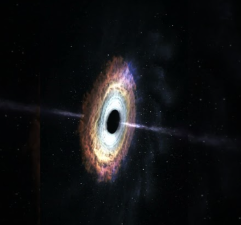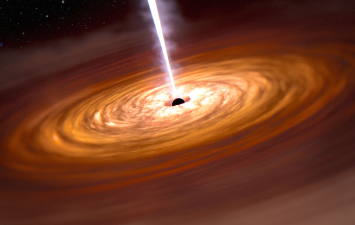Observing black holes
When we observe a black hole in the universe, the first thing that comes into view is the bright accretion disk around it. The accretion disk is composed of matter attracted by the gravity of the black hole. These materials rub and collide with each other during high-speed rotation, generating huge energy and releasing strong radiation, making the accretion disk one of the brightest celestial bodies in the universe. From a distance, the accretion disk looks like a glittering halo surrounding the dark black hole, which is breathtakingly beautiful.
A gentle trap that distorts space-time
The gravity of a black hole is not only powerful, but also distorts space-time. According to Einstein's general theory of relativity, mass will bend space-time, and the huge mass of a black hole causes the space-time around it to be extremely distorted. This is like putting a heavy ball on a flat rubber membrane, and the rubber membrane around the ball will be pressed down. Near a black hole, the distortion of space-time is so great that the concepts of time and space become blurred.
If a spaceship approaches a black hole, the time on the spaceship will slow down relative to the outside world. As the spaceship gradually approaches the event horizon of the black hole, the speed at which time passes will become slower and slower until it almost stops. To outside observers, the spacecraft seems to stay on the edge of the event horizon forever, while the astronauts on the spacecraft feel that time passes normally. This distortion of space and time is like a kind of "gentleness" given by the black hole, making the matter entering it seem to enter a different world.
However, this "gentleness" hides deadly dangers. Once matter crosses the event horizon, it can no longer escape the gravity of the black hole. In the process of falling toward the singularity, matter will be affected by huge tidal forces. Tidal forces are caused by the different gravitational forces on different parts of an object. Near a black hole, this tidal force is extremely strong and will tear the object into pieces, just like tearing a piece of bread into thin strands. This cruel ending is in sharp contrast to the "gentleness" brought by the previous distortion of space and time.


